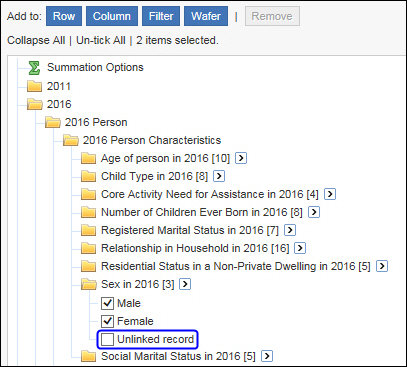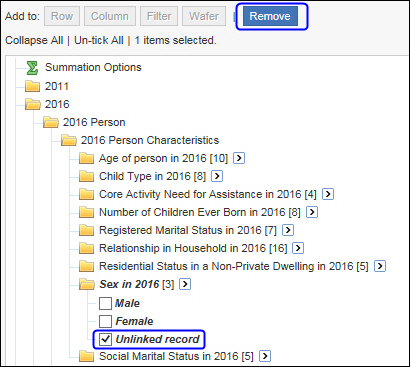FILE STRUCTURE
The ACLD datasets in both TableBuilder and DataLab are single-level files that count persons.
In TableBuilder, data items have first been separated by year of collection. Each data item for the person in 2011 has a corresponding item for 2016. In addition, data items that provide longitudinal information derived from both years, such as the consistency in reporting of certain data items between 2011 and 2016, is in a folder labelled 'Quality Indicators' (see also Using the ACLD in TableBuilder).
For each year, data items are further divided into the following groups:
- Person - person-level characteristics, covering demographic, culture and language, education, employment and unpaid work topics.
- Family - derived from the characteristics of the family to which the person belongs on Census Night - e.g., age of youngest child in family.
- Household - derived from the characteristics of the household to which the person belongs on Census Night - e.g., total weekly household income.
- Dwelling - derived from the characteristics of the dwelling in which the person was enumerated - e.g., type of dwelling.
- Geographical Area - geographic classifications on both a usual residence and place of enumeration basis.
- Female Parent - derived from information about the person's female parent, provided the parent was counted in the same family on Census Night - e.g., labour force status of female parent.
- Male Parent - derived from information about the person's male parent, provided the parent was counted in the same family on Census Night - e.g., labour force status of male parent.
- Spouse/Partner - derived from information about the person's spouse/partner, provided the spouse/partner was counted in the same family on Census Night - e.g., highest educational attainment of spouse/partner.
- Quality Indicators - consistency flags, imputation flags and movement indicators to assist with the assessment of the suitability of records for inclusion in analysis.
UNLINKED RECORDS
The ACLD file contains all sample records from the 2011 Census panel, both those that were linked to a 2016 record and those that were not. Records that were linked have information for 2011 and 2016. Records that were not linked have information for 2011 only.
Data items for both 2011 and 2016 have a category labelled: "Unlinked record".
- the unlinked record category for 2011 data items is empty. It may take on a value in the future once the file is further augmented.
- the unlinked record category for 2016 data items indicates records from the 2011 Census that were not linked to a corresponding 2016 Census record, i.e., these records have valid information for 2011 but no information for 2016.
Excluding Unlinked Records in TableBuilder
When using the weighted summation option in TableBuilder, no results will be returned for unlinked records in 2016
, as weights were not applied to these records. Results including unlinked 2011 records will only be returned if analysis is performed on unweighted data.
To exclude unlinked records from your analysis, deselect the "Unlinked record" category in each data item before adding it to the table. Such a table would produce a sample count corresponding to the equivalent table run with weights. Refer to the
TableBuilder User Guide (cat. no. 1406.0.55.005) for more information on how to select data items for tables.

If the 'unlinked record' category is present on a data item that has already been added to a table, it can be removed by selecting this category within the relevant data item and then pressing the 'Remove from Table' button.

Note that removing any category, such as the 'Unlinked record' category, from a table where data has already been generated will clear all data, meaning the table will need to be rerun.
 Quality Declaration
Quality Declaration  Print Page
Print Page
 Print All
Print All